Automatic language translation
Our website uses an automatic service to translate our content into different languages. These translations should be used as a guide only. See our Accessibility page for further information.
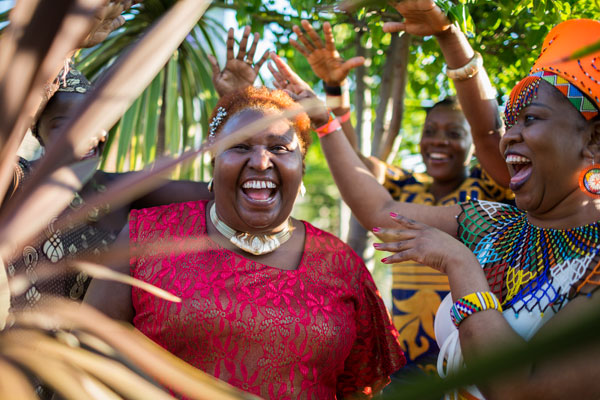
They call me ‘Big Mama Rosemary’. I live in the western suburbs of Sydney. I arrived in Australia in 1999 from Kenya. I was alone and with only $300 in my pocket.
I started with a lot of volunteering with the African community and then did my Diploma in Community Service. I am now a Multicultural Liaison Officer for NSW Police and I volunteer a lot to support the local African community, especially African women and young people. In 2012, I was nominated as Parramatta’s Citizen of the Year.
There are so many women in my community with talent in weaving and sewing and painting but they are quite isolated and don’t have much language. But even without language, it doesn’t mean they don’t have talent though! So I started the African Village Market, a pop-up shop where we sell African fabrics, artwork and paintings. At the moment we are trying to work out how we can afford to keep the market running due to the high cost of rent and the pop-up program that was run by the Parramatta Council finished.
I also coordinate the annual African Women Dinner Dance, where we have performances, a fashion parade and dancing. All these projects bring African women together to help form community and help give them access to services they need while socialising. Many of them are struggling, and they really need these kind of outlets.
I also take women from multicultural backgrounds on a cultural exchange program to regional and rural towns for three days. They live with host families in their homes. These women haven’t done this before and you can imagine the fresh air, laughter and learning, not to mention the stress-free time. So far we have gone to Ulladulla, Bathurst, the Blue Mountains, Griffith, Maitland, Gerringong/Kiama and Corowa.
Last year I had a performing role in the Baulkham Hills African Ladies Troupe at Belvoir St Theatre. I was one of four women who shared about our real life experience, with the help of professional singers and dancers. All our stories were extraordinary stories of survival, about very confronting issues like rape and domestic violence. I did this because I wanted to help other women to not be silent. We performed at the Riverside Theatre, Belvoir, Opera House in Sydney, and in London and Southgate as well. The Troupe is a celebration of women, human rights, laughter and resilience. It was very inspiring to us and the people that saw us. We have just finished a feature documentary about our stories. We want to give it out at high schools, so that especially young boys can learn that it is not okay to abuse women.
As I get older I like to help the younger ones to learn and do things that I myself can’t do at my age. I encourage the young ones, especially the women, to arm themselves with education, which will be their shield in this world because they can work anywhere in the world. At my age I live my life through being happy and engaging in different activities.
I ran the Big Mama’s Big Day Out Road Trip for local women over 45. We had breakfast at Lithgow, lunch at Orange, dinner at Dubbo – stayed for two days visiting tourist attractions in this town. We then went off to Griffith, stopping in Parkes where we saw the big dish. We went to Wagga Wagga, then to Canberra, then back to Sydney. We all felt young again! Age is just a number and so I say, 'Just go out there and do what you like doing and don’t let the age hold you back.'
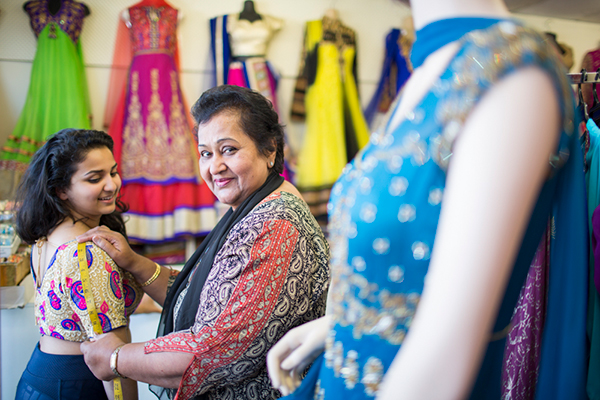
I am originally from Uganda, and arrived in Australia in 1973 as a refugee.
After working various part-time jobs while my 4 kids were young, I started my own business 16 years ago – a fashion shop in Harris Park selling Indian fashion.
I'm very independent and I like the freedom of running my own business. I don't like someone ruling me! This business, a fashion shop, allows me to choose my hours too.
Ageing is a big challenge. I've already had various health problems, like cancer and other things. What helps is keeping your mind active. It's so important. My business helps me do that – there's always a long list of things to think about and so much to do. And also spending time talking to family, customers and the community is very important. For example, I make sure we have a weekly get together with my family – every Saturday night about nine of us gather for dinner, including my grandchildren who I love so much. Otherwise, if you don't keep interacting and talking to people, older people can get depressed.
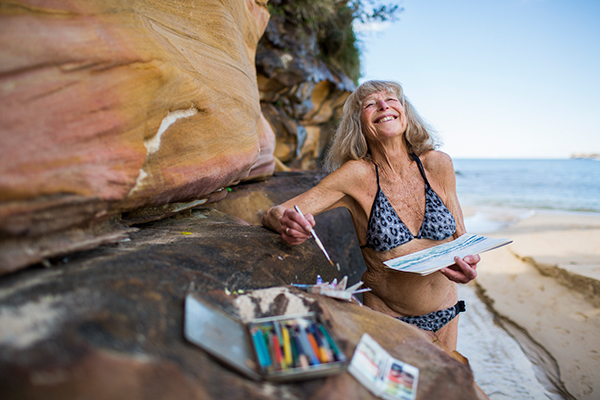
I was born in Germany and came to Australia at age 7. I grew up in the western suburbs but later moved to Coogee. I married in my early 20s and still married 47 years later to a great 67 year-old scientist.
I worked as a graphic designer, an art teacher as well as doing my own art. I retired in my early 60s.
I have been swimming at Coogee Beach every day for decades and still do.
My routine is to swim, get out, put on a dry bikini, and get my watercolour paints out to sketch and paint seascapes as well as people on the beach. Then swim again, put on another bikini (I have hundreds!) and repeat the process – it used to be seven times a day, now down to three.
I live art, it's me. Ever since I was a little girl, I've done it. Art is a meditation for me where you lose yourself.
I find with growing older there are physical issues – like I've ruined my skin with all the sun exposure! I regret that. But inside I don't feel older. So much so I forget how old I am and tend to overdo things. However, I'm aware of time running out – in 20 years I'll be 87! I feel good now but one day of course it's going to end.
Swimming, sketching and sex! They all keep me going and they all keep me young. My husband and I are also involved in lots of other activities, such as a choir.
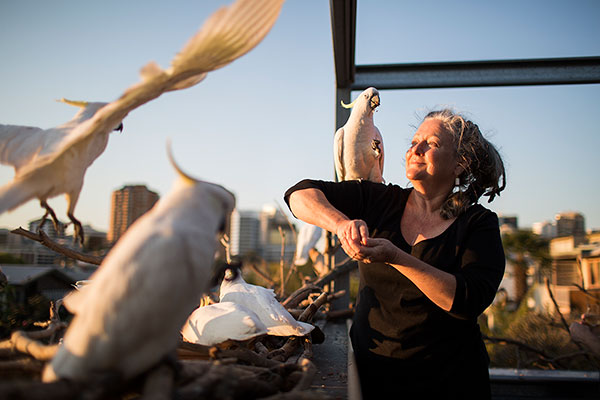
I moved into my present house 20 years ago and discovered from the neighbours that cockatoos had been visiting for 30 years prior. The previous owners had fed them sunflower seeds every day, and had left a bag of seeds to encourage the new owners to continue the practice. (FYI, cockatoos can live up to 80 years of age.)
I’ve always been a bird fancier so was happy to continue feeding them daily.
In 2011, the Cockatoo Wingtag project was set up by John and Adrian at the Royal Botanic Gardens and Sydney University, to help learn more about the Sulphur-crested Cockatoo (Cacatua galerita) behaviour within the Sydney region, for example, how they are adapting to living in the city.
As part of the program, me and my partner report any of the 100 tagged birds that visit, so their movements can be tracked. I also sponsored and named two cockies – Rosencrantz (no.82) and Guildenstern (no.83) – and delighted to have had the opportunity to report them both.
I am passionate about helping wildlife to survive and thrive in an urban environment. Our native species were here before us and they need to be supported to help them continue to live alongside humans. Aside from that, I am passionate about the cockies. Can you imagine life in the city without birds? There would be a terrible silence. We need to keep the bird song alive – even when it's as loud as the cockies' squawk!
I don't think about age. I just keep going on. Because what would be the point? There's so much in life to make you happy, why would you concern yourself with thoughts of your demise? There's so much to be joyful about. Having said all that, you have to do your best to remain healthy to give yourself a good chance of a long and healthy life. And part of that is keeping yourself happy – which the cockies help me do.
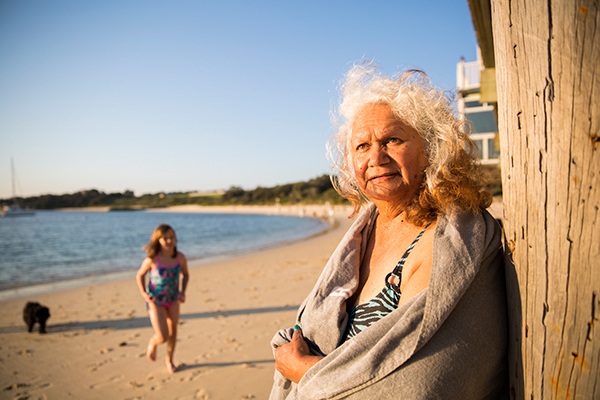
I’ve been caring for my niece’s daughter, Alice* for the last five years, since she was four years old. I was a caseworker with an Aboriginal organisation that looked after foster carers, but I gave that up when she came to live with me full time. She has PAPA Syndrome which is a rare arthritis in children. I have to give her a needle every night and take her to the specialist every three months. The doctor is very pleased with how she is going – she’s put on weight and her hair has grown.
All my kids have grown up, and having a little four year old was daunting at first. At first it was so hectic. I have five grown up kids but I hadn’t looked after children for a long time. And with visiting the Children’s Hospital often and caring for Alice’s special needs and getting her ready for school, to cater for her disability was hard. But then I got used to the routine so that helped me manage things a bit better. And having a car was really good. I have health issues myself. My daughters help out a lot. If I have to go to hospital they look after Alice. Her school was so accommodating and the hospital clinicians helped a lot.
It’s really physical work. And emotional as well. To see her sick is upsetting. If she just bumps her finger when she is playing, it swells up and she has to go to hospital. But it’s so rewarding to see the great results with her health and we have a lot of fun together. We go out, we go to the movies, we go out to dinner. We’ve been to Queensland to the theme parks. She loves camping. I love camping too, but it's getting harder to get out of the camp bed these days.
I know a lot of older Aboriginal people stay home because it’s a big effort to get out and there aren’t many places for Aboriginal seniors to go and be together. But I was already very involved in the community.
I’m still very active. I’m a member of the Aboriginal Advisory Committee with Blacktown Council and I advise council on issues in the community. I’m a JP as well. I did volunteer policing for the local police station. Especially for Aboriginal people in lock up, I’d help them out if they needed something to eat or something to wear in court or just a listening ear. That was interesting. I’ve slowed down a lot now because of caring full time for the little one.
I’ve just done my Cert IV in Aboriginal Art recently. Art interests me. And I go to my local sewing group every Monday night too. My daughters say, 'Hold on mum, slow down.' And I think 'What for?'
* name changed for privacy reasons
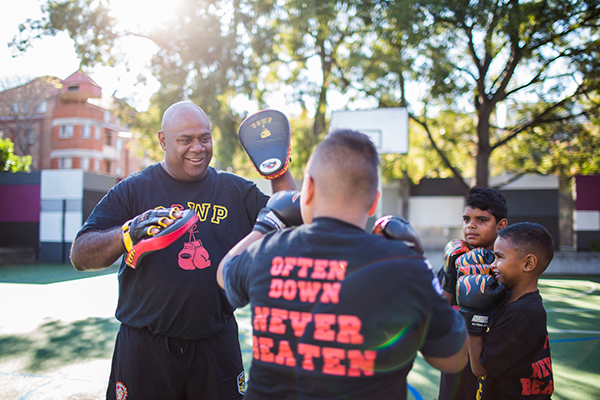
I was born and raised in Redfern and run programs here under Tribal Warrior, a non-profit community organisation initiated and directed by Aboriginal people with Aboriginal Elders. It was started by two Elders. The values from those Elders continue to be passed on – teaching routine, focusing on what you can do, and empowering each other.
In our programs we teach young people that as you get older you don’t deteriorate, you increase in value – values such as wisdom, communication, caring, and being the glue of family and community. As Elders, it is our responsibility to pass knowledge down to provide the tools, pathway, skills, and means for people to continue to be strong. What I have noticed about our kids in Redfern is that they are more embracing of our culture. Before, a lot of our kids looked to emulate what they saw as ‘cooler’ black people in American culture. We moved the lens so people can see our strengths and link to our past. The other day I saw a kid say, 'You're too "Americanised",' and I was happy and proud when I heard that. We want to teach that value of a person is about how much you care about each other, build capacity and pass knowledge on.
I found myself in Tribal Warrior. I was a young man in my 30s – angry, resentful, carried scars of the past and hatred. They manifested because I saw we didn’t have a role or position as people in our community. The lack of hope created a real division and rift. We were in a city where if you stepped across the road, you were different.
Tribal Warrior through their smart, wise and humble leadership, taught me how to rethink all of it. I owe myself to those fellas. I’m glad I took it on and saw what they did. And I thought, I need to do the same and teach these kids. We all have to give back.
We don’t teach them how to survive anymore, we teach them how to thrive. Humility is one of the greatest tools of a human being. It is the new tough. 'Take it and keep moving forward. Eventually you will understand where you are going.'
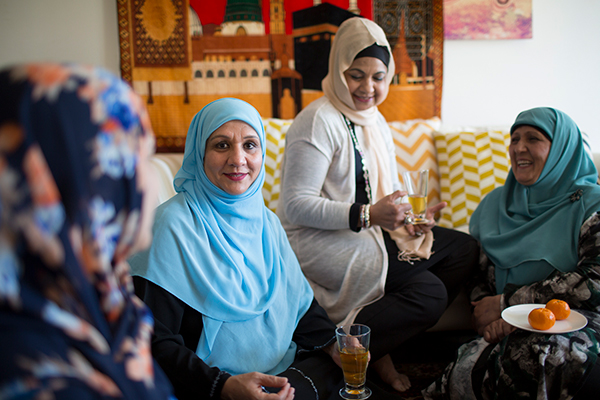
I was born in Kabul, Afghanistan. I was very political at a young age and had to flee the county when I was 15 years old because the Soviet authorities became aware of my activism. I spent two years in a Pakistan refugee camp and eventually moved to Australia.
The first few years in Australia were tough but I gradually taught myself English and worked hard to support myself. During this time, a doctor working in a refugee camp in Pakistan contacted me asking for assistance in raising funds for a group of orphans who had no one else to care for them. I asked around my local community and was able to send some money to these young orphans. From then on I decided I would dedicate my life to easing the suffering of those in Afghanistan who have felt the worst of war. I founded Mahboba’s Promise Incorporated in 2001, and the organisation continues to run schools, pre schools, medical centres, vocational training programs and community gardens for disadvantaged communities across five provinces in Afghanistan today.
I have never forgotten how hard those first months and years in Australia were, and it occurred to me that there remains limited support for older female migrants and refugees adjusting to Australian life. Many women have few friendships outside their immediate family and can feel socially isolated, leading to mental health issues. Because of this I created Bibi’s (Auntie’s) House.
In Afghan culture, aunties are a source of wisdom and support, with many of life’s lessons passed down by aunties. Women from the Afghan and wider Muslim community come to Bibi’s House on a regular basis for tea, the chance to chat with other women from similar backgrounds, and to participate in education sessions on a range of topics relevant to them. Past sessions have included nutrition, the Australian legal system, balancing new and old cultures, and managing finances. I want to build up their confidence to interact with their wider community and use the knowledge gained at the sessions to create a more positive life for themselves and their family.
Bibi’s House is always open to migrant and refugee women who need someone to listen to them and help them work through their issues.
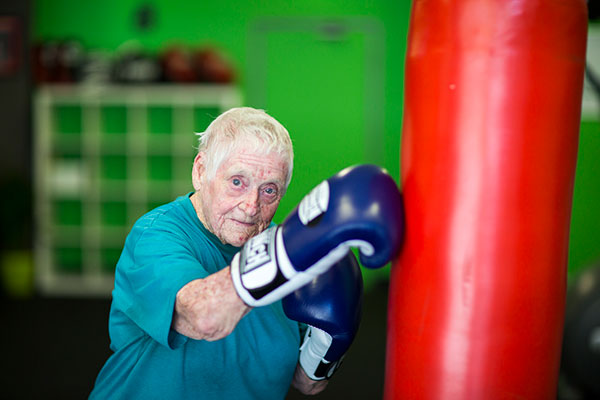
I’ve been going to the Centre for Strong Medicine – the weight resistance training clinic for older patients at Balmain Hospital – for 20 years. It’s the only clinic like it in Australia. They see exercise as medicine. It’s all funded by Medicare so I don’t pay any fees. I do shoulder, chest and leg presses at the clinic, and trained exercise physiologists help me use the machines and make sure I make the right movements.
I am very proud of my physical fitness and I love to show people my muscles, and I can even lift my leg onto the table. The doctor says I’m as strong as a 40 or 50 year old woman.
I was referred to the clinic to help with my chronic clinical depression. My 25-year relationship has ended and I was alone and struggling. The clinic doctor said that the resistance weight-training program would help me. And it did. It’s helped my depression a great deal. And it gave me a lot of self-confidence and showed me that I could be strong and healthy.
I also really enjoy it. I enjoy being able to maintain my strength, self-sufficiency and confidence. I enjoy the ritual of it and involve myself with the other patients and the local community. It’s good to get up, get dressed, get out, have a destination. I go twice a week – on Wednesdays and Fridays.
Along with their physical health issues, I believe most of the other patients at the clinic suffer depression too because they live alone without family or support. And I think they are also depressed because of ageism, and because they are devalued.
I am entering my 90th year. I’m pretty damn old. And I’m the oldest patient up there at the hospital.
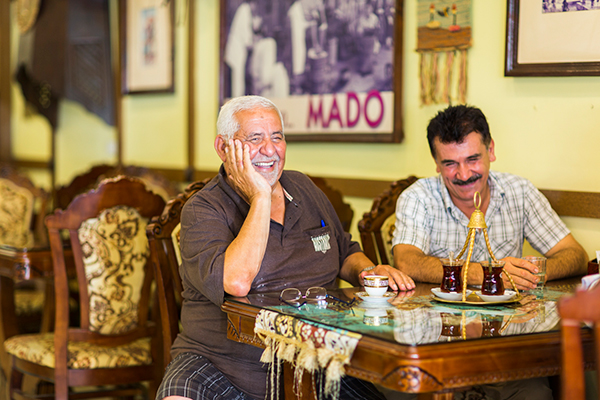
I have lived in a lot of different places. I was born in Palestine and then lived in Lebanon, Turkey and Iraq. I came to Australia in 1982 and my family came out in '83. I got my Masters degree from Sydney University in Social Administration. I started as a bilingual caseworker and then became a manager in community services.
I do a lot of volunteer work for the community. Like solving problems, giving advice and resources, interpreting – helping people. Refugees and new arrivals to Australia – even people who have been here a long time but speak little English – need a lot of help with a lot of issues. They have troubles with Centrelink, health, social housing, education, legal matters. And if there’s one thing I always tell people, it’s ‘knowledge is power’.
I am well known in the community. I used to manage the local Arabic-speaking community association. They now refer people to me. My mobile phone is always ringing. A gentleman just phoned me and asked me what to do about a conflict with his wife. She wanted to kick him out of their social housing unit. He got my number from friends who said, 'Nayef is the only one who can help you with your problem.' I’ve been here 33 years and I know the systems.
I always encourage parents to talk to the teachers about their children, to go and know how your son or daughter is doing in school – how are they behaving? – who their friends are. I have meetings at my house and I invite local parents to encourage them to maintain good contact with the schools. The future of their children is important. And school is one of the main resources for children to learn, make good friends and stay well.
I also organise a lot of community picnics for families and older people. We go to beaches, to parks, down the coast, and even to the mountains.
I never feel bored. I am always busy. There are always people to talk to and help.
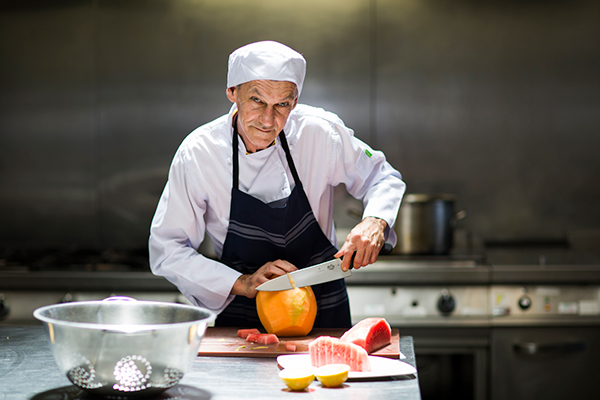
I had been travelling overseas and it opened my eyes to see how the rest of the world lives. Then I came back to Australia. I didn’t want to return to my old job as a motor mechanic as they changed it so you had to get re-licenced. I was tired of being mechanic and wanted a change. It’s a younger person’s game now.
I saw a pamphlet at the local job network place. It said, 'Come and do a seven-week hospitality course.' And I thought, 'I’ll give that a go. Everybody’s gotta eat.' The course was run by Bright Hospitality and held at the Wesley Mission. The things I learned there were quite interesting: how to store food properly, that sort of thing.
Part of the course was a job placement where they try and get you into a job. A lady at the job network mentioned they needed cooks and kitchen hands up at the Q Station at North Head. I thought it sounded like a unique place. My course coordinator organised a trial for me. That day I worked from 7am til 3pm. The last hour I cut my hand. But they still gave me the job.
It’s been nine weeks so far, and I think I am going pretty okay here. I find working in a professional kitchen pretty interesting. The chefs are all good people and are all willing to help me. They’re great. They know my capabilities, and encourage and push me to be better.
I’m hoping to give this career a go and I’ve been doing some online hospitality courses since being here. I am definitely the oldest in the kitchen. I think I have to work harder than everyone else just to keep up. I am really tired by the end of the day. But I do enjoy it.
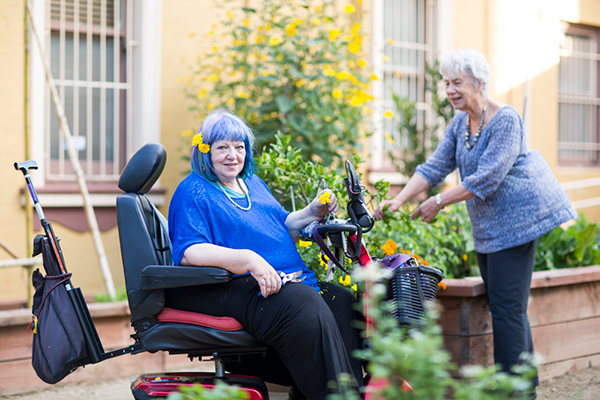
I'm Tasmanian. I have lymphodema and both legs are in compression stockings from toe to hip. I had over 30 fractures in a car accident. I spent 12 weeks in hospital last year. Two years ago I was in a coma for 11 days and I had to relearn how to walk.
My first child died. The second had a serious head injury and, although beautifully spoken, he is manic and difficult to manage. I consider myself an unvictim. My third child had a little boy who delights in smelling and tasting Grandma's herbs.
Our whole family are food and health orientated. I cook with my heart and soul, and my husband has only been sick once in 30 years. I grind and roast my own herbs and spices, and cook Chinese, South American, Thai, Chinese, Mexican, Indian and French. I really enjoy the company of my colleagues at the community garden.
I want to tell the world how to manage wellness, eating well, making good cheap food, and managing pain of the body and heart.
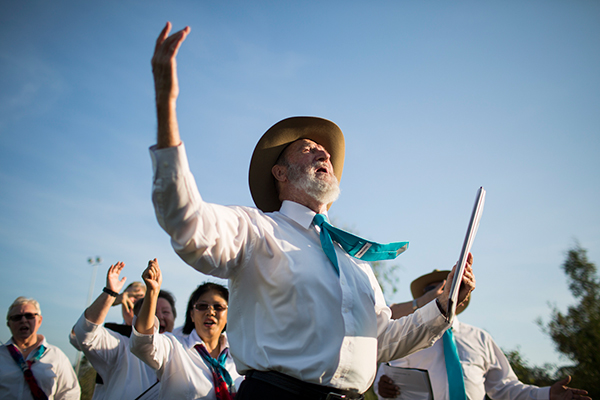
Simply Voices started in 2007 with support from our local TAFE and Blacktown Council, as a project to encourage seniors to get involved in their community and meet new friends. We currently have 40 members (male and female) with ages ranging from early 50s to mid 80s. We have people from Anglo-Australian heritage as well as people from Malta, Italy, China, Malaysia, Japan, Philippines and Spain. The majority are retired or working part time. Most of us have had no formal musical training. We sing acapella (no musical backing), which is why we are called ‘Simply Voices’.
Many of our members have belonged to school or church choirs, and want to get back to singing for pleasure. Some live alone and see the choir as a chance to enjoy social interaction. Some join because their friends have recommended the choir. There are also many new friendships formed, and many shared outings to see musical and theatre performances.
We meet Mondays from 1.30 until 3.30 at the Blacktown Civic Centre (we take a break during school holidays). We enjoy the tutelage of a choir director for this two hours per week, funded by Blacktown Council. We perform around Sydney’s western suburbs at community festivals, multicultural events, and retirement villages. We do not hold auditions, and anyone over 50 is very welcome to come along and see how it feels before joining (very few decide against it).
Choir director, Linda, presents us with harmonic arrangements of folk songs and popular songs, and the joy of achieving performances in three and four part harmonies is easy to see. We use some stretching and vocal exercises before starting practice, and this improves breathing and general fitness. Performing for appreciative audiences does wonders for our self esteem and sense of achievement.
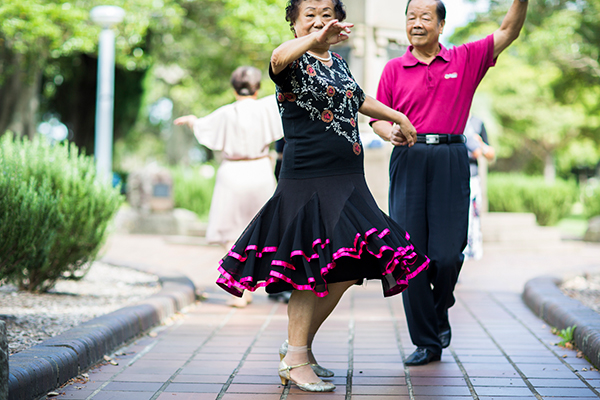
Ballroom dance parties for older people have been running at the Ashfield Town Hall for over ten years. The classes are free and about 120–130 people attend each Wednesday, mainly from Chinese backgrounds.
Participants love to meet there every week to waltz, rhumba or cha cha, to make friends, and stay fit and active.
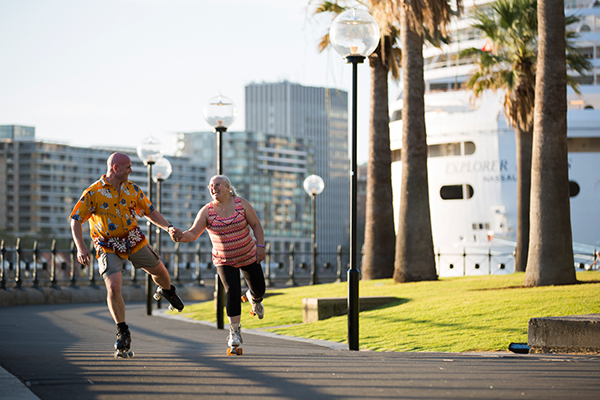
Debbie: We basically grew up on skates. I was teaching the beginners class, and Andrew brought his nephews and nieces to learn to skate. I remember he also had his girlfriend with him. That was the last time I saw her though.
Andrew already knew how to skate in the days when we wore strap-on skates. I bought my first set of proper speed skates at 17.
Andrew: Skating brought us together. Then Debbie converted me to artistic skating – it’s figure skating on roller skates. We used to do jumps and spins and lifts above the head.
We stopped skating when we had kids, but took it up again 18 years ago when they were a bit older. They all wanted to skate too as they liked the pretty outfits.
The whole family has competed at national and international competitions. We won Oceania Championships in Masters Dance seven years ago. It’s like ballroom dance on wheels.
Debbie: My left hip went one year and I had a hip replacement 18 months ago. Andrew’s knee is affected with osteoarthritis. But it hasn’t stopped us skating.
We have our own business and I guess you’d say we’re semi-retired. Skating is an enjoyable activity. You can do it whenever you like. It’s great for families; you can do it together with your kids. And it’s popular now with older people who take it up again when younger ones in the family want to learn.
There are no council-funded facilities for skating. It’s all funded privately. When we skated world championships, it cost us $36,000 that year.
We’re pretty busy. We coach skating, and judge skating competitions. Last year, we started studies at University of the Third Age. We’re learning Spanish and ballroom dancing – it’s a lot of fun. We’ve also just started jazz and funk dancing. We do boxing at the gym as well. We will pretty much try anything, except bungee jumping. That sounds a little extreme.
14 Oct 2022